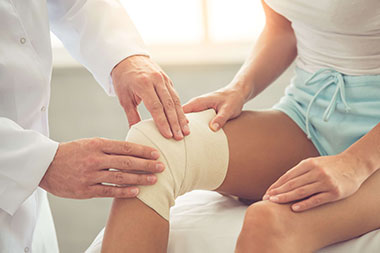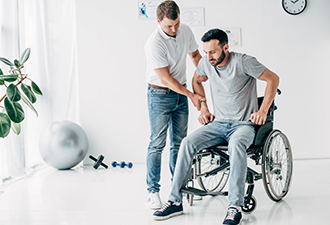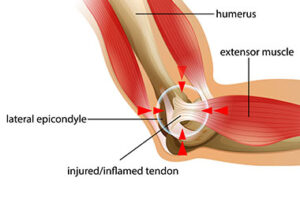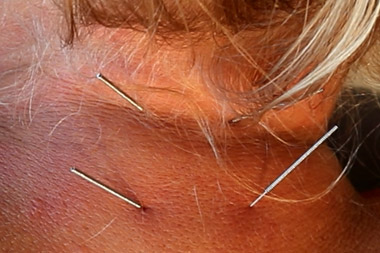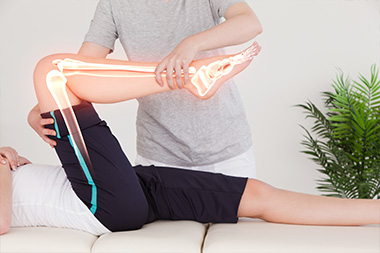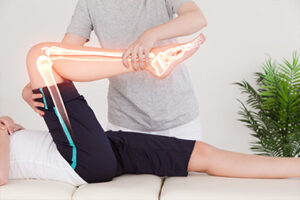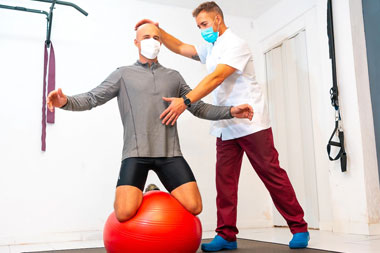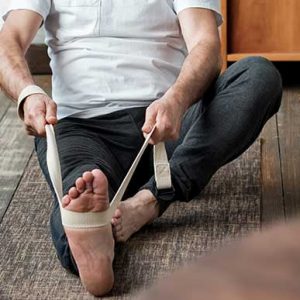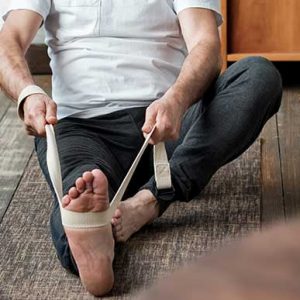
The human body and mind are two sides of the same coin. Physical pain, be it chronic or sudden injury-inflicted, restricted mobility, and stiffness of body parts can lead to a dull and depressed state of mind.
Physiotherapy can help with pain alleviation and pain management and also mobility management by combining a holistic set of routine and advanced exercise modules as well as prescription treatments.
Physiotherapy is essential in treating pain inflicted by sudden injuries or accidents, posture-related neck and back pain issues, arthritis, sciatica and spinal disk-related injuries, fractures and scar of tissue etc.
Following are the acute and lifestyle-related conditions that require the able hands and care of a trained physiotherapist:
Sports injuries: This is very common among players, both at beginner’s as well as advanced levels and sometimes take months to heal before one can get back to the grounds.
Elbow conditions (golfer’s or tennis elbow): This is not just seen in people playing golf but anyone who is into repetitive movements at the wrist can get this condition, including plumbers and carpenters.
Carpal tunnel syndrome: It’s caused by pressure on your median nerve, which runs the length of the arm, goes through a passage in the wrist called the carpal tunnel and ends in the hand. Repeated motions like typing or conditions like rheumatoid arthritis can trigger this pain, which is experienced in a tingling sensation, numbness or acute pain in the wrist and fingers.
Long working hours-induced neck, back, arm, and wrist pain: This is very common among people who lead sedentary lives and are exposed to long working hours before the computer due to the nature of their work.
Other conditions that require the able hands of a physiotherapist are recurring headaches, muscle sprains, running injuries, post-surgery pain, women’s health and ante/post natal-related pain, nerve impairment/entrapment, plantar fasciitis or policeman’s heels (inflammation of the tissue band that connects the heel bone to the toes), and shoulder conditions (frozen shoulder and rotator cuff issues that are characterized by stiffness and enlargement of the shoulder joint).
There are other long-term conditions that require the expertise of home physiotherapy care for all-around healing. These conditions include:
Injuries related to falls and slips be it from the stairs or in the bathroom.
Elderly people often suffer from chronic pain induced by arthritis, surgery, or sudden pain inflicted by a fall.
Patients who have survived a stroke can require physiotherapy sessions to resume normal day-to-day activities.
Patients who have undergone a joint replacement surgery can require regular physiotherapy sessions at home to resume movement.
There is also trusted effectiveness of physiotherapy care at home for the following illnesses: Arthritis, cancer survivor care, cardiac rehabilitation, dementia care, Parkinson’s (a disorder of the central nervous system that might cause tremors and stiffness), lymphoedema (swelling in an arm or leg muscle caused by lymphatic system drainage), musculoskeletal disorders (denoting disorders pertaining to the musculature and skeleton combined together), obesity, urinary incontinence, and vestibular rehabilitation (an exercise-based program designed by a certified physiotherapist to improve balance and reduce dizziness-related problems).
If you are in Dubai and looking for good physiotherapy clinics in Dubai, following is the criterion that you must identify as the markers of a licensed and trusted physiotherapy clinic:
A good physiotherapy clinic will provide preliminary assessment and diagnosis and then devise a rehabilitation program customized for the patient’s particular condition.
A modern, well-trained expert physiotherapist should be able to combine both clinical assessments with circumstantial knowledge and hands-down treatments with prescription-based exercise modules.
A good home physiotherapist will be able to deal with both chronic and sudden nature and degrees of pain as well as experienced athletes, seasoned players, accident victims, and amateur gym visitors.
A good licensed physiotherapist should be able to assess each patient in their home environment and take into consideration their personal goals, problems related to self-esteem, and design an exercise-based module as per the patient’s requirements. Such a conversation-derived rehabilitation programme can only bring true comfort and relief to the patient and their families. It is the duty of an efficient, well-trained, certified physiotherapist working at a licensed physiotherapy clinic to make the patients understand that rehabilitation should start as soon as possible to achieve a speedy recovery.
For patients with acute conditions, the physiotherapist might have to develop a maintenance programme to limit further complications such as muscle atrophy and chest infections.
At Dubai Nightingale, our trained physiotherapists are able to take note of the patient’s lifestyle and background, discuss their personal goals and anxiety issues, and study their body and mind responses and faculties in their home environment to devise a full-proof physiotherapy program that involves the use of a range of apparatus and techniques (electrotherapy, massage, manual therapy, and progressive exercise). This is done to ensure the patient is able to regain mobility and functionality in their lives and their overall quality of life is also improved by devising a module that will help them be more active and positive. Increasing mobility potential and decreasing levels of pain are the two most fundamental concerns of our experienced physiotherapists.
Our physiotherapists track the patient’s progression, right from the beginning days, and prepare a progression chart to assess their improvement using standardized, valid, and reliable measurement tools.
Dubai Nightingale therapists can work closely with home medical nurses, relatives, psychologists so that the patient’s treatment is holistic and aims at all-round progress.

